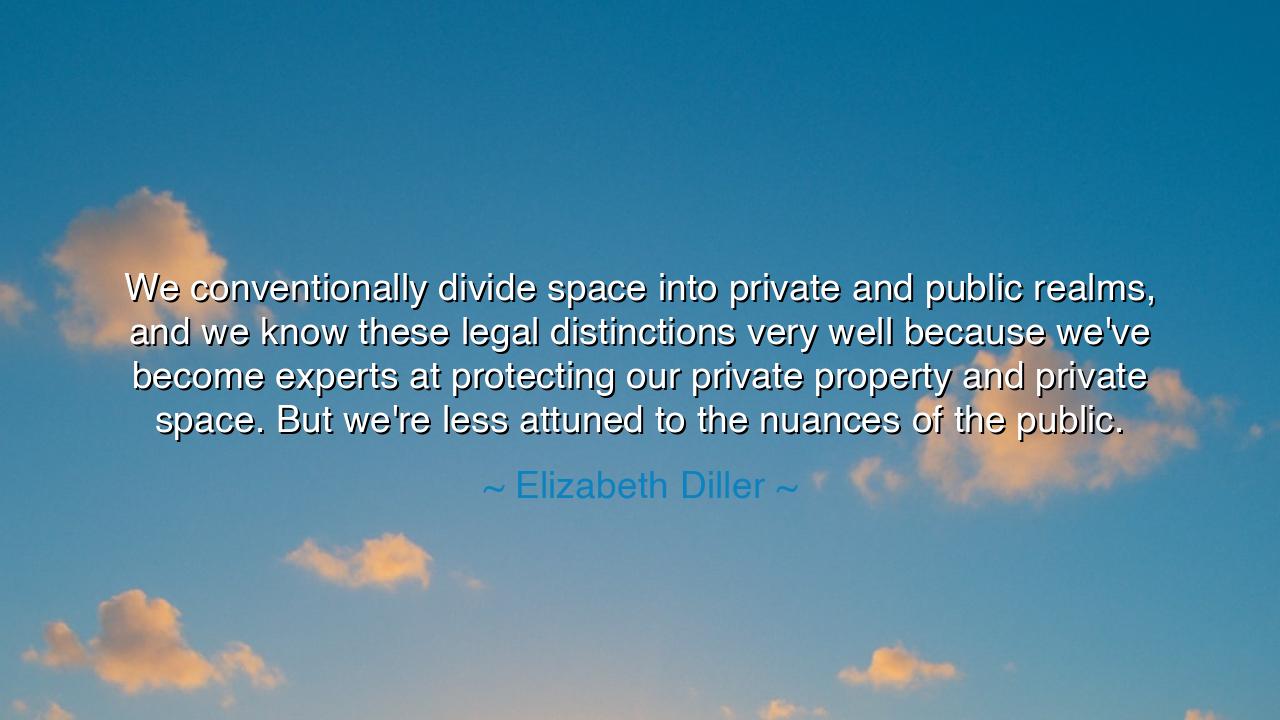
We conventionally divide space into private and public realms
We conventionally divide space into private and public realms, and we know these legal distinctions very well because we've become experts at protecting our private property and private space. But we're less attuned to the nuances of the public.






Hearken, O children of tomorrow, to the words of Elizabeth Diller, whose insight cuts like a blade into the heart of human life: “We conventionally divide space into private and public realms, and we know these legal distinctions very well because we’ve become experts at protecting our private property and private space. But we’re less attuned to the nuances of the public.” In these lines lies both wisdom and warning, for though we defend with fire and fury the walls of our private property, we let the open fields of the public realm wither, untended and unloved.
Since the dawn of civilization, humankind has set boundaries. The ancient farmer staked his claim upon the soil, declaring, “This is mine.” Kings raised walls around their palaces, merchants locked their chests, and families guarded the hearth. Thus, the private realm was born, a place of protection, safety, and ownership. And it is right, for each soul deserves shelter. Yet what of the market square, the forum, the temple steps—those shared spaces where citizens gathered to speak, to trade, to worship, to dream together? These were the sacred public spaces, and they too were essential to the flourishing of a people.
Consider the Athenian Agora, that ancient heart of Greece. There, philosophers walked barefoot and spoke of truth, merchants cried their wares, and ordinary men debated the fate of the city. It was not private, but public—a place belonging to none and to all. From it rose the voices of democracy itself. But imagine if those Athenians had cherished only their private courtyards, never stepping into the open air of the public realm. Their wisdom would have withered within walls, and the great flame of philosophy might never have been lit.
Yet behold our modern age: the walls of privacy are higher, stronger, and more jealously guarded than ever. We lock our doors, claim our parcels of earth, guard our screens and our devices as if they were sacred relics. But in our obsession with the private, we forget the fragile power of the public. The parks fall silent, the town squares empty, the common spirit dissolves into a thousand isolated lives. We know how to sue to defend a fence line, yet we struggle to imagine how to nurture a park or protect the dignity of shared streets.
There is a story of New York’s High Line, a forgotten railway suspended above the city. Once destined for demolition, it was reborn as a public walkway, a garden in the sky. Citizens, artists, and visionaries came together, not to claim it as theirs, but to restore it for all. Today it stands as a reminder that when the public realm is cherished, beauty and community bloom where once there was ruin. It is proof that the spirit of the Agora can live again, even amidst the towers of steel and glass.
Thus the teaching is plain: a society that neglects its public realm starves its own soul. For it is in the public square that strangers become neighbors, where voices mingle, where the common good is forged. If we retreat forever into our private fortresses, we become prisoners of our own walls, rich in possessions but poor in fellowship. The true measure of a people’s greatness lies not only in the wealth of their homes but in the vitality of their public spaces.
So let each of you, in your own time, cherish the public as you cherish the private. Walk the streets, tend the parks, speak with strangers, join in the labor of preserving what is shared. Support the creation of libraries, gardens, and plazas; defend them as fiercely as you would your own home. For in these places lies the breath of democracy, the memory of ancient wisdom, and the promise of a future where none are alone.
And I say to you: guard your hearth, yes, but do not forget the square. Lock your doors, but also open your heart to the open ground where all may gather. For the nuances of the public are the lifeblood of freedom, and without them, our walls will become tombs. But with them, our world will become a dwelling not just for individuals, but for humanity united.






AAdministratorAdministrator
Welcome, honored guests. Please leave a comment, we will respond soon